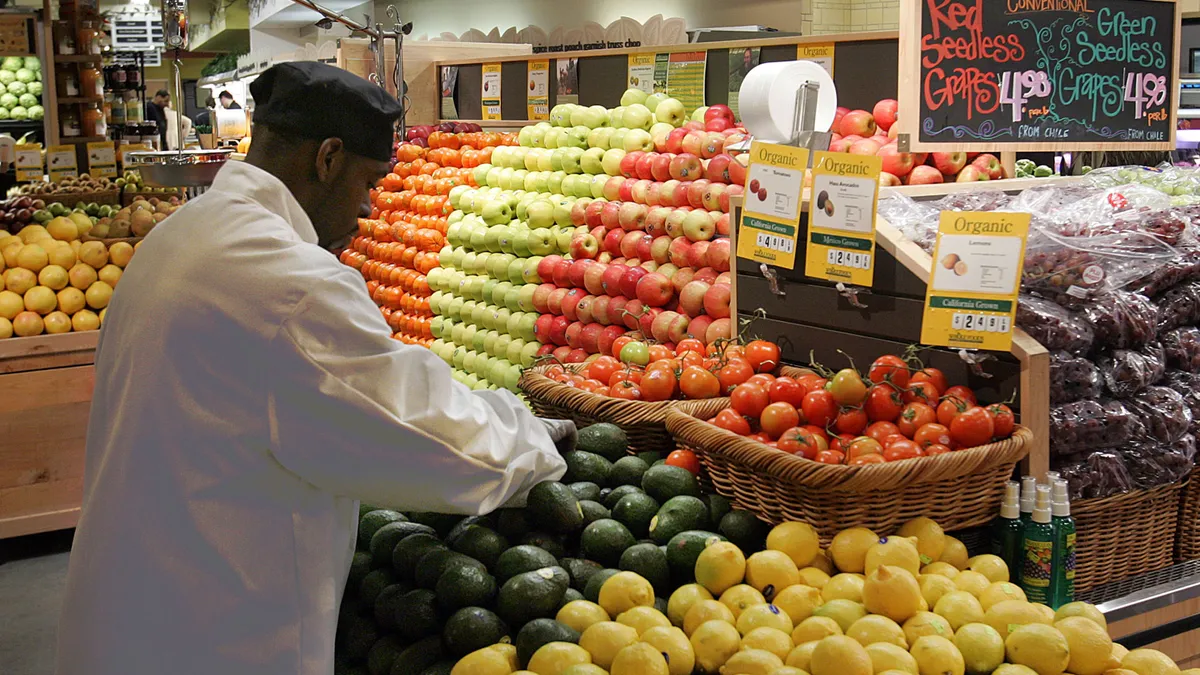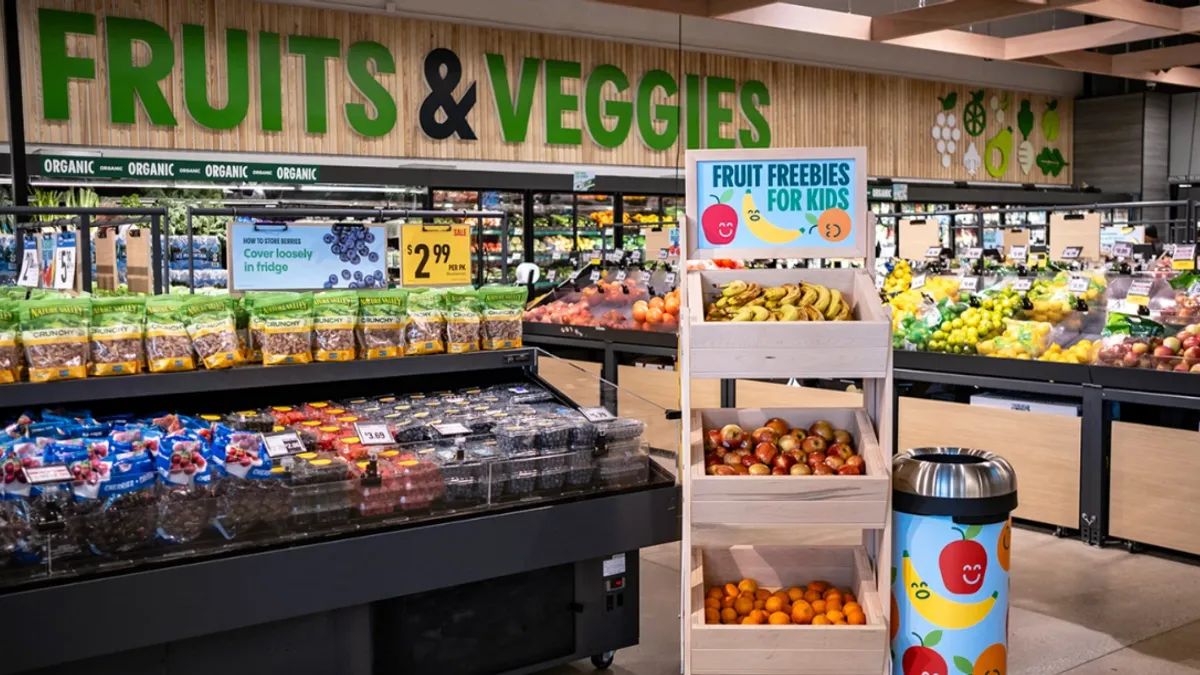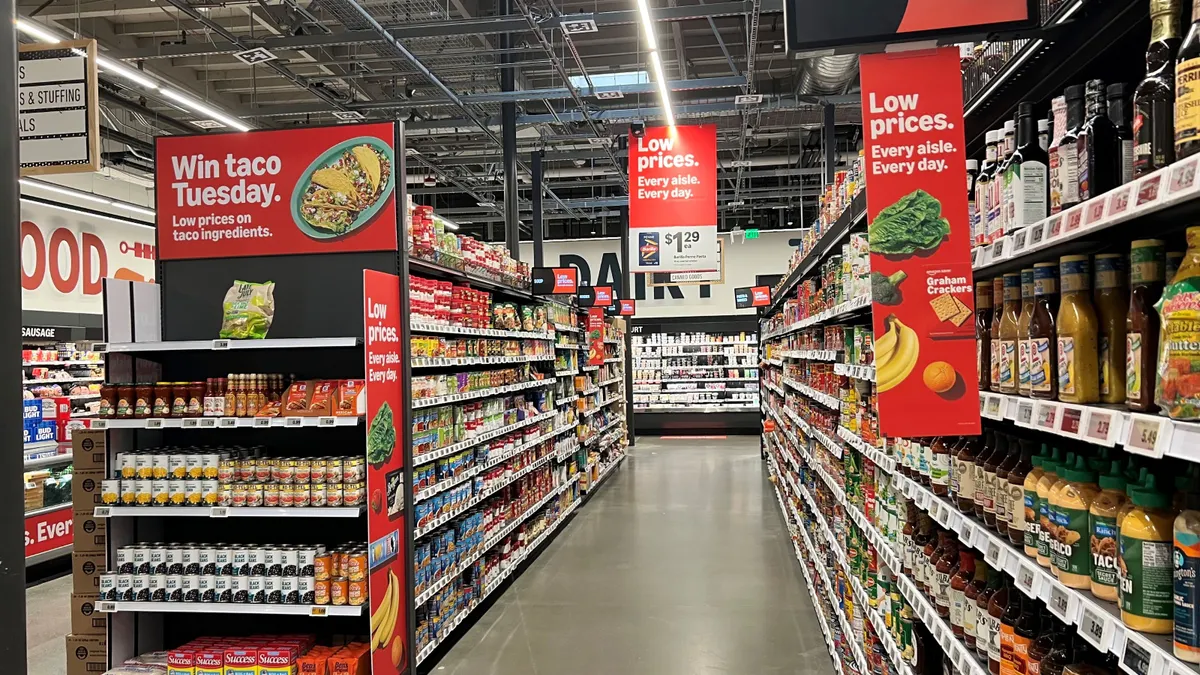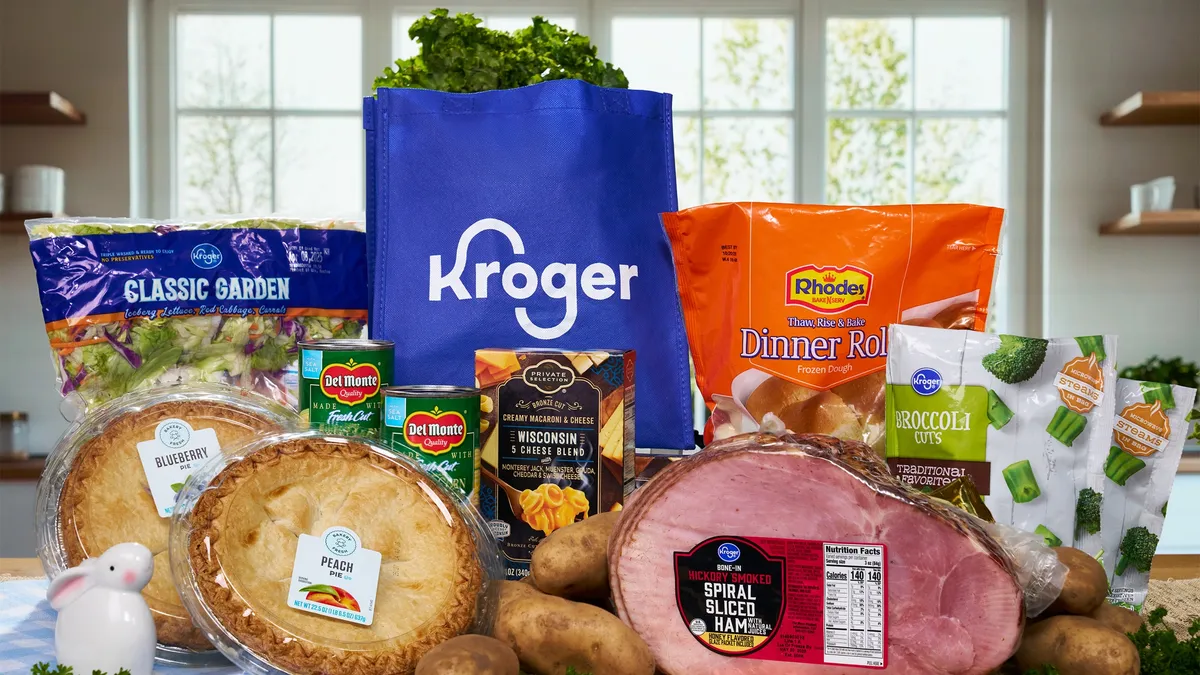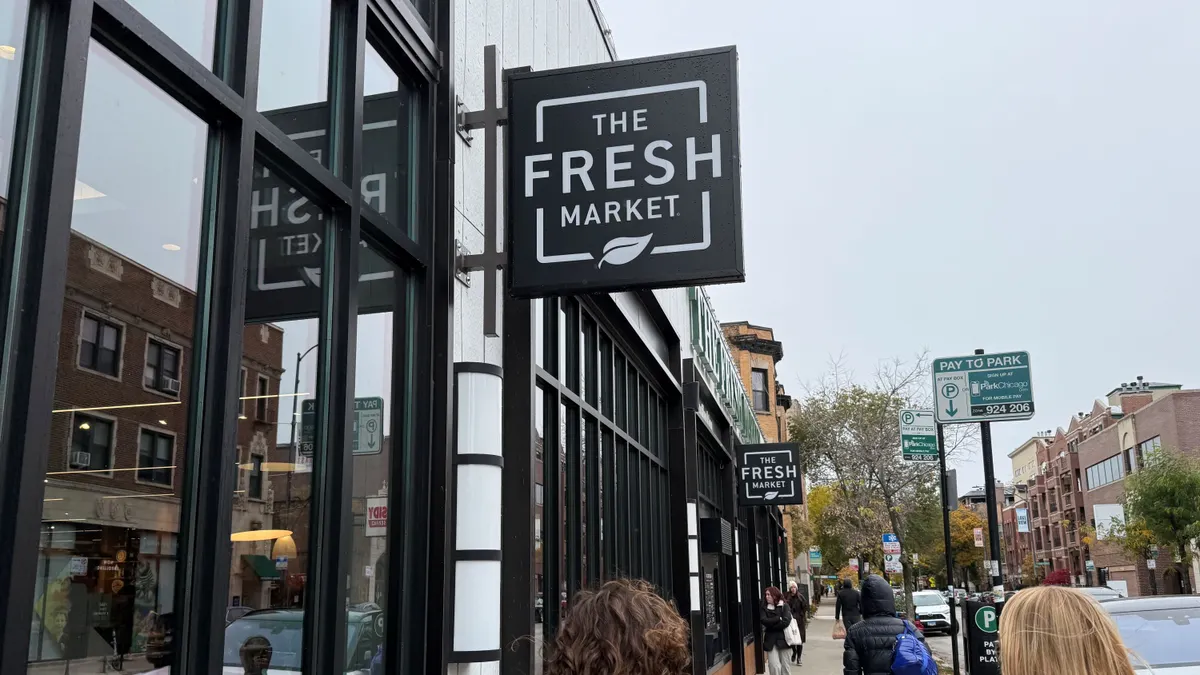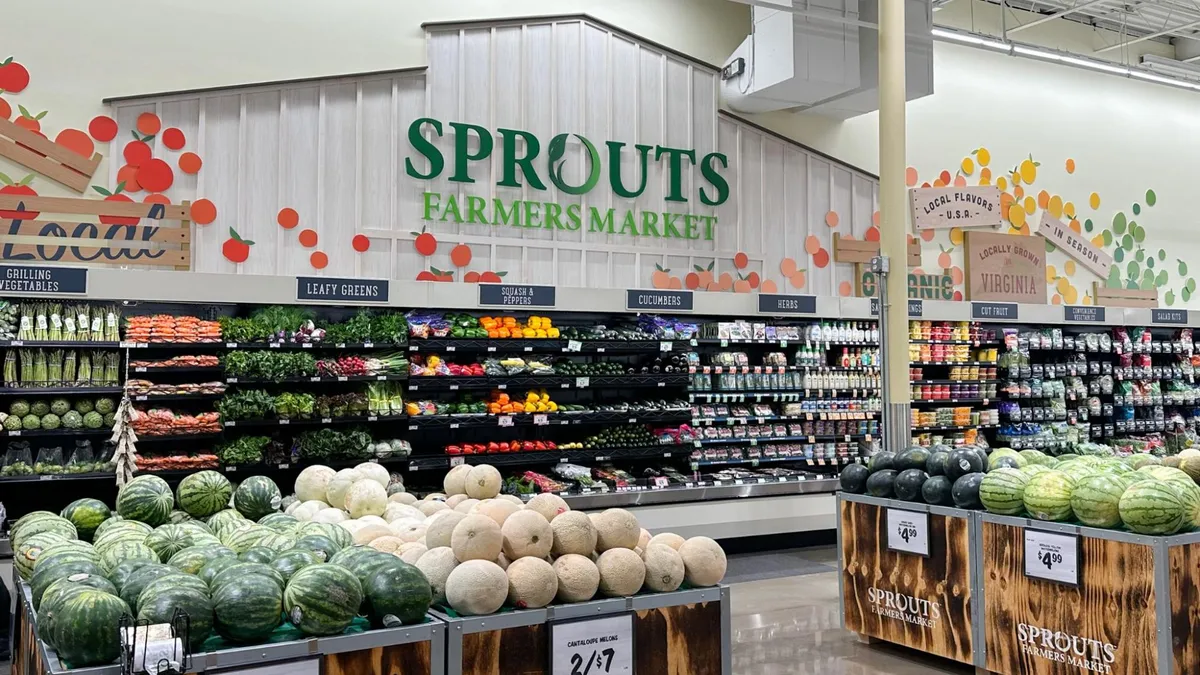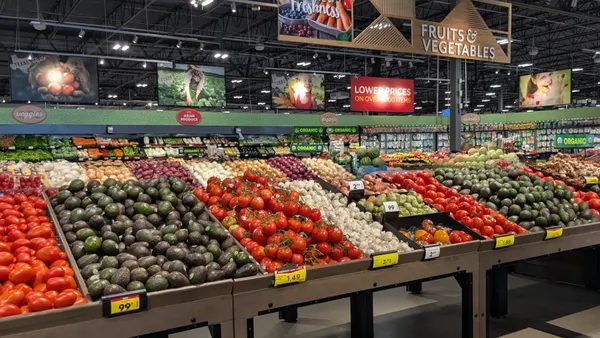This is the second story in a three-part series examining the relationship between grocers and their workers.
Growing up, Ellen Story never considered making a career in the grocery industry.
But then she took a job as a cashier at the Stew Leonard’s store in Norwalk, Connecticut, in the mid 1980s. It was only supposed to be a brief, part-time gig — a way for her to pay for her car insurance. She worked at the store throughout high school, then earned a scholarship from the grocery company that helped send her to the College of William & Mary.
Story would work at the store during summers and over holiday breaks, and she enjoyed the flexibility the company afforded her. When she graduated from William & Mary in 1992, Stew Leonard’s offered her a full-time position in its human resources department.
Nearly four decades later, Story is now vice president of human resources for the company.
A lot has changed in the industry, and Stew Leonard’s has opened several locations since Story began working for the company. Still, she said her lack of awareness of career opportunities in grocery as a teenager remains a familiar narrative.
“I’m sure if you asked 100 of [Stew Leonard’s full-time employees], probably 95 of them would say a similar thing to what happened to me,” she said. “I had no idea, and so I think it’s incumbent upon us as an industry to shout about these opportunities.”
Convincing workers to see grocery jobs as more than just stocking shelves or ringing up products part-time is a challenge the industry has faced for years. And it may become a bigger problem as companies face increasing pressure to develop the sort of talent that will help them innovate and compete in a rapidly evolving industry.
Grocers aren’t sitting back and waiting for the problem to fix itself. They’re developing new training resources, internships and internal policies to help them identify promising candidates for store leadership positions and corporate roles. Faced with an ongoing shortage of people interested in filling store and warehouse jobs, they’ve also done more to promote career pathways within their organizations.
On its website and in marketing materials at store checkout counters, Stew Leonard’s is showcasing workers who have risen “up the ladder” — like Nevin Philip, who started as a store cashier and advanced through several positions to become vice president of the company’s Paramus, New Jersey, location.
To entice management candidates, Stew Leonard’s offers a special management training program for college graduates. The company doesn’t require that managers have a college degree, but this particular program, which includes classroom sessions and working alongside a development manager inside stores, offers a “fast track” into those leadership roles, said Story.
Stew Leonard’s also runs a yearly “leadership bootcamp” for current management-level workers who show promise of some day becoming store directors or senior executives. Participants have monthly sessions covering various aspects of the business, like marketing and finance. They also work together on a project that company leaders assign to them, like evaluating a loyalty program or remaking the coffee department, Story said.
This year’s leadership bootcamp fielded 38 applicants, of which six were selected.
“If you show these folks that you are committed to them, that you’re investing in them and there’s a future for them, they stay a long time. We have a lot of examples of that,” said Story.
The Giant Company is also trying to give its associates a leg up and ensure it has the right workforce skills for the years ahead. Last year, the Pennsylvania-based grocer started Giant University, an internal education program that teaches everything from produce merchandising to how to read a profit and loss statement. Classes are available in-person at Giant’s Carlisle, Pennsylvania, headquarters and at the company’s e-commerce fulfillment center in Philadelphia. Salaried, full-time workers can also take classes remotely.
Giant employees teach some of the classes, while instructors from local colleges lead others. Employees who participate are granted up to eight hours of paid, dedicated time each week to do coursework.
Giant University courses are designed to help workers advance through the company ranks, or to just do a better job at their current role, according to a company spokesperson. Next month, Giant aims to roll out a “My GU” app that offers more courses and better ways of tracking workers’ progress through their classes.
“We had all these disparate training programs, and we said, ‘We need to have a unified strategy for one interface, a place where people go for their learning,’” said Matthew Lutcavage, former chief human resources officer at The Giant Company. (Lutcavage left Giant in May and is now chief people officer at Total Wine & More).
Lutcavage said the power of Giant University is in the way it can personalize training and career development. “If people are able to select what they’re most interested in, the curriculum and certifications they want to take, there’s going to be a greater chance of success,” he noted.
The program can also help Giant upskill workers in the years ahead as trends like automation and foodservice continue to advance. “We’re able to make sure that we’re forecasting what skills are important and offering those skills to our current team members,” Lutcavage said. “Things like data analytics are huge and aren’t going away.”
Having an internal “university” system is helping focus training efforts at SpartanNash, as well, said Mike Koppenol, vice president of human resources for the Michigan-based retailer and distributor. Earlier this year, the company launched SpartanNash University, an “experiential cohort learning environment” that enrolled more than 300 company leaders and “aspiring leaders.” SpartanNash also launched SpartanNash Academy, which offers training for frontline store and warehouse workers interested in advancing within the company.
In addition, SpartanNash offers on-demand courses through Workday, an online human capital management platform, that cover everything from finance to improving presentation skills. Last year, SpartanNash employees completed more than 100,000 hours of training through the system, or approximately five hours per employee, Koppenol said in an email.
“If you show these folks that you are committed to them, that you’re investing in them and there’s a future for them, they stay a long time. We have a lot of examples of that."

Ellen Story
Vice president of human resources, Stew Leonard's
‘I didn’t feel like there was a direct path to get my head above water’
Grocers hope that by offering more training resources and illuminating career pathways for workers, they can boost retention. Since the pandemic began more than two years ago, tough working conditions coupled with poor prospects for advancement have spurred many frontline grocery workers to leave their jobs.
Natalie Reitz worked as a barista at a Whole Foods Market store in Michigan beginning in January 2020. After more than a year spent navigating safety protocols, stressed-out customers and the introduction and loss of hazard pay, she quit and took a position as a production intern at Detroit Public Television.
Reitz, who is a photographer and videographer, said she might have stayed with the company longer if she saw a way into doing creative work, either at the store or corporate level.
“I didn't want my lifelong career to be grocery and frankly, I have the education that I don't have to have a lifelong career in grocery,” she said.
Likewise, Adam Kaat said he didn’t see clear opportunities to advance at the various grocery jobs he’s held. The Denver resident took a cashier position at Whole Foods shortly before the pandemic struck. He eventually rose to a supervisor position in the prepared foods department and said he could have potentially stayed on and navigated the “political” process of becoming an assistant manager. But it would have taken too long at the pay he was making and under the stressful working conditions he experienced.
Kaat now works as a customer service representative for a food company. He recently published a book about working in a grocery store during the pandemic, “Life on the Grocery Line.”
“I didn’t feel like there was a direct path to get my head above water very quickly,” Kaat said.
Lutcavage acknowledged that frontline jobs are difficult, requiring lengthy shifts and working weekends as well as holidays. He said Giant hopes its new training programs can help workers become more engaged with their roles, which could keep them with the company for longer.
“We may have gotten an extra year and a half out of someone because we were investing in them,” he said.
Giant is also trying to make its store management jobs more attractive by improving work-life balance. The company recently experimented with a four-day workweek for managers. It’s also making more of an effort to stagger its management shifts and keep a close eye on weekly hours so that its store leaders don’t work too many hours.
At Stew Leonard’s, Story said she’s hoping to develop a program that will expose promising employees to various positions around the company, similar to how doctors in training go through rotations across various disciplines. The goal would be to match them with a career opportunity that they love.
“By exposing them to all these different areas and moving them around, they might find one that they’re really passionate about,” she said.


